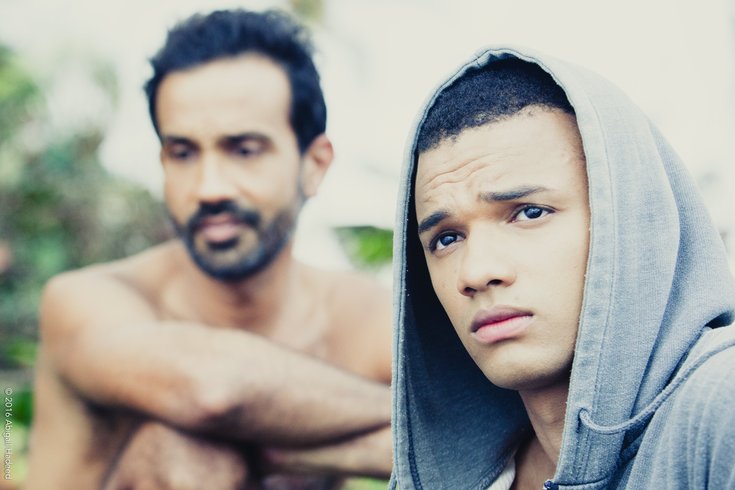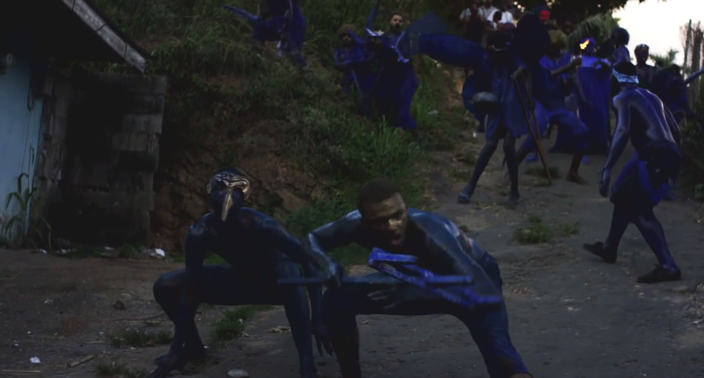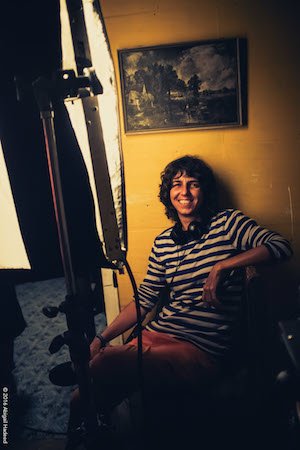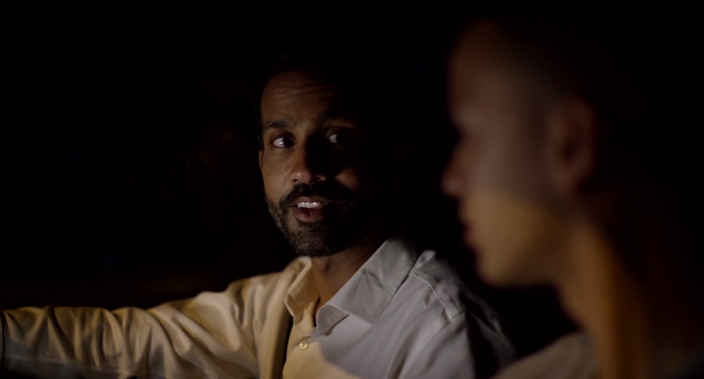
July 07, 2016
 Handout Art/Maria Govan
Handout Art/Maria Govan
Petrice Jones, who plays main character Gregory White, beside Gareth Jenkins, who plays James Young.
Update: "Play the Devil" has since been voted Best Film of qFLIX 2016 by the festival's jury members.
qFLIX 2016, Philly's annual LGBT film festival that's taken the place of the now-defunct QFest, is in full swing, showing LGBT films from around the world through Sunday, July 10. And to be sure, few of those are as compelling as Bahamian filmmaker Maria Govan's dark, heart-wrenching "Play the Devil."
The film is set in Trinidad — doesn't take long to tell, based on the actors' accents — and follows 18-year-old Greg White through a crucial few weeks in his life, in which he's seduced by an older man, struggles to come to terms with his sexuality and is all but crippled by the expectations of a doting grandmother determined to keep him from becoming his deadbeat dad. The end — after a slow and slightly melodramatic build-up — is a tightly tangled web of conflicts that finally snaps in its satisfying conclusion.
Here, a chat with Govan, who premiered the film at the Los Angeles Film Festival last month to rave reviews, for answers on how the film came to be, how LGBT people are received in Trinidad and what on earth the film's ending was supposed to say. (So yes, some spoilers ahead.)
My understanding is this isn’t exactly a true story, but it is loosely based on one. Can you explain?
It’s not at all based on a true story. What happened was at one point when I was in Trinidad, a young boy had committed suicide actually — he had been involved with an older man in his 20s, and maybe that's not a whole lot older, but still. And so that was kind of the inspiration, just because it broke my heart. Just that he felt that there was that much fear and shame that he was so alone, really. That he would do that.
I started thinking about this space in the Caribbean and how, especially for men, [being gay] is a really difficult thing to come to terms with — even more so for Afro-Caribbean men. Black men. But I was reflecting on that. The story is completely fictional and obviously I didn’t want to create any character who killed himself; I wanted to speak more to violence and how, whether you internalize it or externalize it — it’s not ideal obviously, so the whole thought of the film, for me, was looking at violence and how oppression creates a lot more violence in our lives than just sort of being authentic. Which is so simple. There are so many systems in place that just break that down; it’s crazy.
A scene from the 'Jab' ceremony in 'Play the Devil,' in which Trinidadian men dance and dress as demons to pay the devil its dues for the year.
There's a striking sense of place that almost makes the movie. And maybe it's a little telling of who the movie targets, which is probably an American audience who doesn’t know much about Caribbean islands and their culture — people who idealize them, in a way. What role did you mean for Trinidad to play in this film?
You know, I went to Trinidad on this travel scholarship and I went to film a traditional Carnival, and I went with Abigail, my producer, and she is a photographer by profession and she had been photographing [there] for a long time. And I saw this whole ritual; it’s very cinematic and powerful. But she also took me in places in the country, just being there — waterfalls, just to see this countryside, and this place sort of — honestly, it sounds so silly, but the story crystallized. The place really spoke to me in this particular way and the story allowed for us to show the diversity of the place. The nature itself, Trinidad is an extraordinary space — culturally, historically, in terms of its tropical scene, natural life. It’s a rich place. It really spoke to me. I saw the Jab and I thought ‘I want to tell the story of a boy who plays the devil.’ And I was thinking about this kid who killed himself, and I’m a filmmaker who is interested in stories about our communities, and so yeah.
What did you learn about the perception of homosexuality in Trinidad?
It’s interesting because there’s a community there that's really open-minded. And progressive. And we did get some funding from the government there who read the script. The Film Commission gave us support and had read the script. But the laws in Trinidad, it’s actually illegal to be homosexual there. And they recently kind of like created the law to also include women. They changed the language. So it’s this very strange place where people are very progressive and yet there’s this other thing, that people are really ... — it’s a complicated society.
At the same time, when we filmed in Paramin, this rural community up in the hills, we were really up front with people. Abigail wanted to maintain relationships with people and what we were doing and people were open to it. It’s a funny thing. All sides to the whole, to what it is to be gay there. There’s a lot of brutality as well. Abigail lost a close friend of hers to violence, who was a gay man. Who had been murdered by a lover. But that was a while ago. So it’s hard to say. It’ll be interesting to see what Trinidadians think of the film because I think it will ask them to reflect on certain things. Even just a conversation. I hope. That’s the hope.
The gay coming-of-age story here almost felt like a side piece, part of a bigger story. Like shining a spotlight on how it compounds with issues that already exists, or how it exacerbates, in the case of Greg especially, the problems he already had. A harsh reality of how homophobia impacts someone’s real life.
It’s a piece of this whole part. It’s just one part of him. And the whole is so complex — he’s this golden boy, but there's a lot of pressure on him to be this person for his grandmother who he really loves, and not only is it clear that he’s probably homosexual but he’s just different. He doesn’t fit in. I think it’s about coming of age in a community where you're this odd person and whatever it is, it makes you feel alienated. It was a hard ending to write and I kind of had many endings, truthfully, and I struggled with it. And I’m still not sure. As an artist and writer, the whole question of 'What do I want people to leave feeling and what am I saying?’ All this time, energy and money. And sometimes that is a lot to carry.
What do you think it does say at the end?
I hope it says that life is complicated. And bad things don’t happen in a vacuum. And there are all these factors and variables that change someone’s life in a moment. So I guess I would hope people don’t judge anyone too harshly in the story. That would be my hope. But I don’t know. I’m sure people will judge harshly – will also project their own whatever it is on the story; it’s kind of open for that.
How did you conceive the businessman character, James? He had this fascinating demeanor, coming off as kind of a gentle soul but also pretty damn creepy for a good chunk of the scenes. I don’t know if it’s just the actor and his portrayal, or what.
That’s a good question. It’s funny because the script, we tried really hard to work away from creepy, and I think it’s easy to be creepy in a subtle way, to interpret that character as creepy obviously. And on the page, even now when I think about the writing, sometimes I wonder — but what he does, coming around, showing up at somebody’s house is pretty intense. But I tried really hard to make him more desperate. It’s not that you don’t like him, he’s not evil, and he’s well-meaning, I wanted him to just be this sad, pathetic person who himself is kind of shriveled up and in denial. He’s so thirsty. He’s somebody who I feel, not just sexually as a predator, but to touch his passion, to touch himself in a meaningful way through this boy. You know?
I can see audiences who are gay, especially people who’ve ever been young and had a romance with an older person, relating to this dynamic. It is very uncomfortable, but in a satisfying way to watch.
Because it’s also human, right? I’m sure a lot of men have been on one or the other side. I’ve shown it to gay men and I care about that audience, and I think it’s interesting too that people who’ve also been on one or the other side of that dynamic — there's an older gay man at the script bubble who said ‘Why did the old guy need to die? The young guy needs to die!’ And he felt protective over that character. It’s just symbolic to me. It’s unfortunate that anybody dies and I question that choice. ‘Is it too much?’ But it’s more just symbolic. And to reflect on this idea that tragic things happen, and they don’t happen in a vacuum. It’s systemic and all of us in different ways play a part in it. And class and privilege play a part in it.
Greg and James in the car during a scene in 'Play the Devil.'
His poor background was a big part of his character as well. His brother going to jail, his grandmother and the leaking roof, etc.
He feels responsible in a certain way, not just for himself.
I wasn’t totally surprised that James died, but I was surprised by how —
You thought it’d be the gun?
Exactly.
A lot of people have said that and I was told even to cut the gun scene because, I’ve been told, it throws people. But I think it shows Devin is this bad boy, giving a glimpse into how far he would go, or the kind of person he is. More than it was about the gun. But I know it was a suggestion. I just wanted it to sort of be an act that was passionate and violent — I didn’t want him to mean to kill him in a ruthless way; I wanted him to be pushing him away, and in the violence of pushing this part of himself away, he killed him. Or thinks he’s killed him. Or worries he did. And then the more worrying thing, which is to put him in the car and send it off.
What’s the meaning of the title?
It’s just what they say, right? ‘Play the devil.’ It’s just a play on words. I guess it’s just referencing the Jab really, and this idea of the shadow. We thought about ‘Pay the Devil,’ which is what you also do in this particular ritual of the Jab: The devils come down the hill and the community pays the devil to go away for the year, it’s part of the ritual. And it’s this really interesting idea that you give the devil his or her dance. Space. You’re not denying the devil. Which is what we do so much in the west. Everybody denies the shadow and we try to be positive, which is good, but there’s sort of a denial of all these other emotions that are a thing.
Is distribution next?
We hope so. We’ll see. It’s such a crazy world, as you know. I would love for this film to be seen because what I think is interesting about it is this sense of place. It’s unusual. There is an audience out there that would appreciate that, but it’s funny, you make a film that’s unique and then the market says you need to make a film that’s more relatable. [Laughs]. You can’t win. But we’ll see. This is the beginning of our festival run. I hope it finds a home. I think it will.
What do you think it means to be an LGBT film today?
... I think it’s really important to dispel clichés and misconceptions about things. No matter how — as small as those groups and persons who are marginalized, I think it’s really important to take up some space and break open all that stuff. Wherever and however we can do that is great. I’m grateful for an opportunity to make films; it’s a huge privilege.
 Play the Devil/for PhillyVoice
Play the Devil/for PhillyVoice
 Play the Devil/for PhillyVoice
Play the Devil/for PhillyVoice